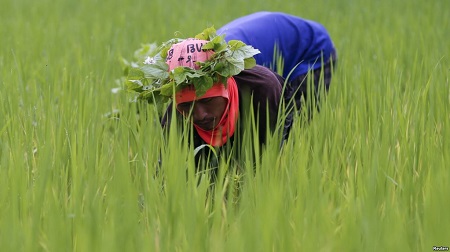Declaring Peasant Rights

Peasants and small-scale farmers have been the backbone of our food systems since time immemorial. Meanwhile, often they have been subjected to land grabbing, displacements, dispossession, criminalization and other abuses in every region of the globe. Despite the promises that came with the dawn of human rights, peasants have not yet benefited from the protection of an international instrument that recognizes their special context. However, closing that human rights gap is the goal of a long struggle toward the formulation of a UN declaration on the rights of peasants and small farmers, an essential step toward the recognition and eventual protection of their specific rights.
Coinciding with the further promise of the world’s 2030 Sustainable Development Agenda to “leave no one behind,” the globalization era’s mechanized agriculture and agribusiness are posing new and greater threats to peasants’ and small farmers’ survival and well-being. State governments and allied corporations are promoting agro-fuels, GMOs and climate-smart agriculture as solutions to the current climate-change, food and economic crises that those combined economic and political interests have created. The drivers of the global agenda call for the expansion of industrial agriculture and the exclusion of peasants, whose organized struggle in this context has fought for the recognition and acknowledgement of peasants’ rights toward achieving the civil, cultural, economic, political, social and ecological dimensions of both equity and equality.
In 2016, the world of competing interests in benefiting from “urbanization” saw the former Habitat Agenda reduced to a narrower “New Habitat Agenda.” Meanwhile, the 2030 Sustainable Development Goals of eliminating hunger and malnutrition, unemployment and poverty all share something in common; they are more prevalent in rural areas and the countryside. The Habitat III shift in focus turned away from the former promise of “balanced rural and urban development” and respect for people’s land tenure to leave the rural half of humanity behind. It is significant also that 2016 was a year that saw the number of rural (indigenous and peasant) land defenders killed triple, while struggling for their human rights.
The focus in 2017 of the UN Human Rights Council returns to a right-based rural policy instrument that widens the optic to develop a UN Declaration on the Rights of Peasants and other People Working in Rural Areas. The current draft elaborates the human rights of peasants and rural workers as they relate to their land, water, seeds and other natural resources and of the importance of improving access to productive resources, agricultural inputs, services and investment in appropriate rural development. This new instrument of declaratory law is to be refined further on 15–19 May 2017 in an Open-ended Working Group session.
After discussing it internally for several years, La Vía Campesina proposed a formal UN-level declaration to the UN Human Rights Council (UN HRC) in 2008. The international peasant movement sees that making their case through UN human right mechanisms will further legitimize their common, global struggle, while also supporting local efforts everywhere.
In 2010, the Human Rights Council took up the global issue and mandated its Advisory Committee to undertake a preliminary study on ways and means further to advance the rights of people working in rural areas, including women, in particular smallholders engaged in the production of food and/or other agricultural products.
The Advisory Committee submitted two studies (2011 and 2012) and, in 2012, the Council established an open-ended intergovernmental working group on the rights of peasants and other people working in rural areas. The Working Group’s first met in 2013, and the coming session with be its fourth.
The fourth session on 15–19 May will review the current draft of the Declaration and a study on the normative sources and rationale underlying this important new instrument articulating the rights of, and corresponding duties to the ones who feed us.
|